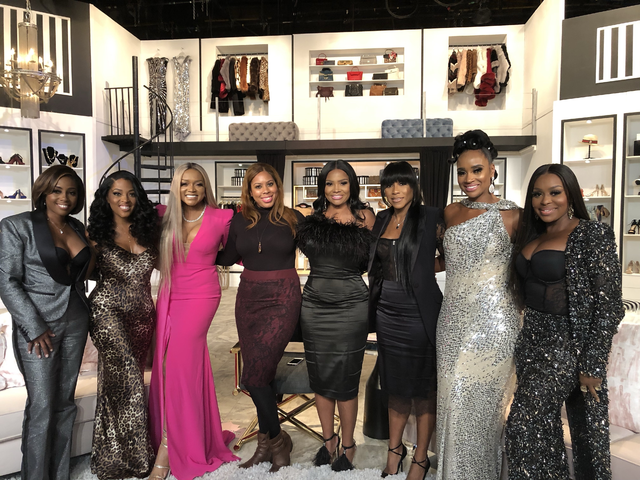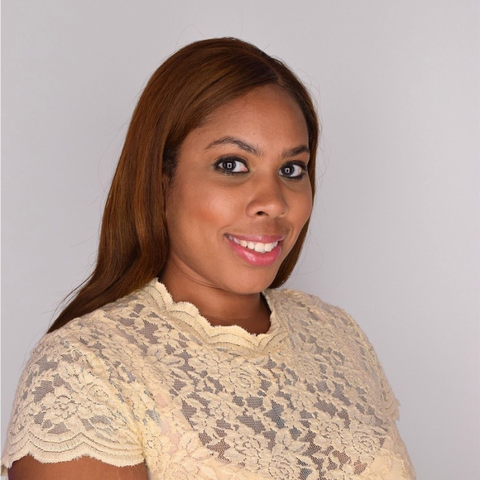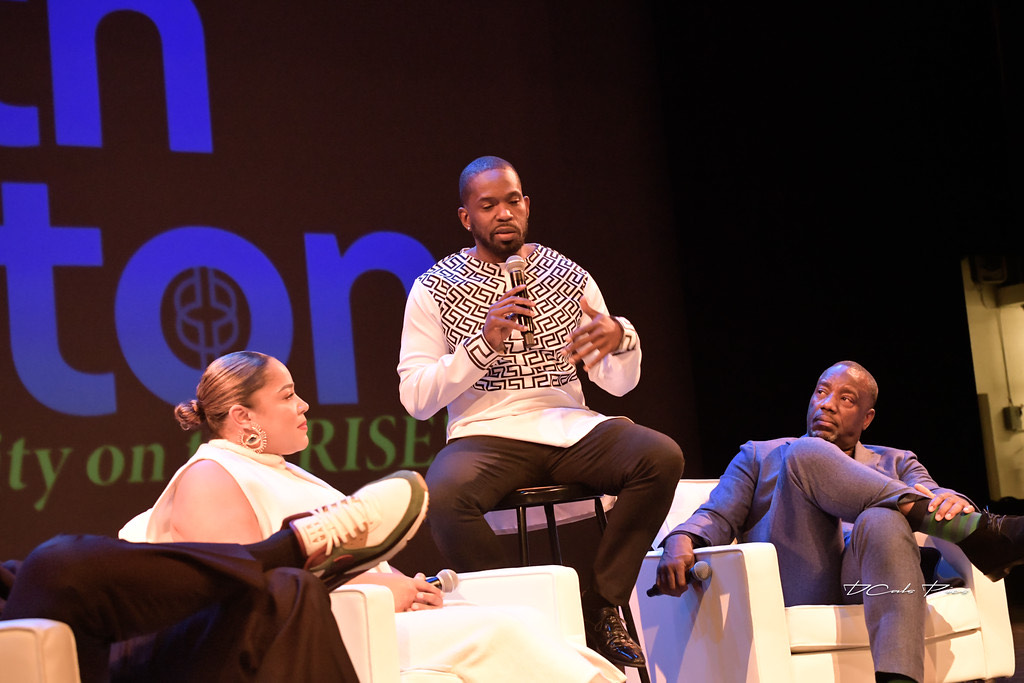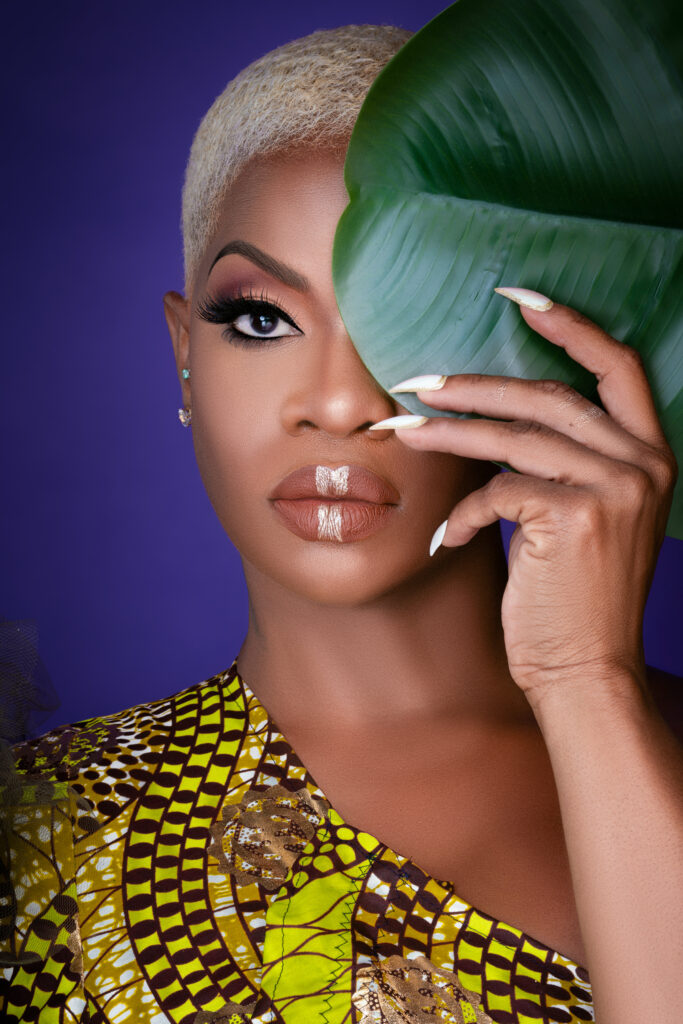If reality TV shows like Real Housewives of Atlanta, Real Housewives of Potomac, Married to Medicine, and Million Dollar Listing are part of your weekly line up, you have a special TV executive to thank for that. Meet Salena Rochester, the Vice-President of Production and Development at BRAVO TV, E! and Peacock. Salena is a graduate of Hampton University and holds a master’s in Film and Television Production from American University. Salena’s career in the film industry began in her 20s. Based in Los Angeles, Salena is a single mother to her son after losing her husband to cancer a few years ago and has embarked on a healing journey since then.
Before joining BRAVO TV, Salena was a page for NBCUniversal working on shows like Weekend Today, MSNBC’s Election Desk, and CNBC’s Fast Money. She has also written for The Grio and guest lectured at American University. With a strong passion for writing and storytelling,Salenacreates her own content for film and television. As Salena continued to the navigate the television industry, she was able to create her own role within BRAVO TV. Now, she is one of few Black women in a leadership role and aims to help more women progress in the television industry.
In an interview with FEMI magazine, Salena shares how she balances motherhood with a demanding career, her favorite TV show she produced, and her advice for women wanting to pursue an executive career in the entertainment industry.
How did you navigate the television and entertainment industry as a young Black woman?
“I have always been authentically Black. I didn’t shy away from giving my opinion on Black content and having a point of view that was unique from my other colleagues. I was never afraid to walk into the head of the department and express my thoughts on a show if I found it offensive or problematic. Oftentimes, people of color don’t want to make waves for fear of being labeled the angry. While I get the fear, I feel like it’s my duty as one of the few Black people at the executive level to speak up and have hard conversations. I also know that I can’t come in like a bull in a candy shop tearing everything up. There’s a delicate balance of being assertive but respectful so that I ensure people aren’t blocking out my message because they feel attacked. I enjoy speaking to lots of different people, so I’ve built a lot of authentic relationships with people at all levels.”
What are some of the challenges of being a woman of color in the television and entertainment industry?
“It can be challenging when I get type casted as only being able to produce and develop Black content. I am multifaceted and have interest in all sorts of things, so I explore developing and producing shows in different genres. I also find it difficult when having to work with cast members on some of my shows. I can relate to the Black women because I’m a Black woman and it’s easy to slip in friend mode when I have to remain in network exec mode. There’s also so much pressure around failing and making it hard for Black people behind you. I feel like if I have a typo in an email people aren’t thinking “Salena made a mistake” they’re thinking “that Black person made a mistake” It’s hard to get out of my head and not feel like the representative of an entire race. I also run into the issue of people not respecting or even assuming I’m an exec on the show. Whenever I go on set for a taping of a reunion, I’m always mistaken for a makeup artist or hairstylist. When I tell folks that I’m the network executive there’s sometimes a look of shock and surprise that I would be in that position. It’s unfair that Black women are labeled and seen as so many things, but corporate executive is the thing that causes shock.”
What did your healing journey look like while balancing parenting and a demanding career?
“I had the benefit of having my parents move in with me while I was healing from the loss of my husband. They did a lot to help me gain confidence as a mother and as a woman having to make decisions on my own. I also threw myself into work during that time. I was traveling a lot focusing on growing my career so that I can provide a comfortable life for my son. I had to stop all of that when the pandemic hit and found myself at home and unable to run from the emotional pain. It was a blessing because it allowed me to sit in discomfort and do the inner work rather than avoiding it. The pandemic also allowed for humanity to enter the workplace. It’s almost impossible to get through a day without my son popping up on a zoom or distracting me while on a call. Everyone is much more accepting of parenting issues now, so I feel empowered to step away from a meeting to help him out. It’s making the demands of my career much easier to handle.”
What has been your favorite reality tv series to produce?
“Married To Medicine is a great show to produce. I get the opportunity to showcase intelligent, highly educated, and successful Black women. I also love that this show is about marriages and families. We focus a lot on how the women manage being career-driven wives and mothers. It’s hard to balance and they are open and willing to showcase their lives – good and bad. As women, we are told to fit into one box, but the women on this show are so much more. We’ve seen couples work through infidelity issues and come out stronger, couples falling out of love but finding love again, divorce, pregnancy issues, wedding anniversaries, and kids growing up. I often say Dr. Simone’s family is like the modern-day Cosbys. They’re so loving and sweet and they represent Black families in a really positive light. I also enjoy working on it because I feel the most connected to the cast. I can relate to them and have real conversations outside of the show. It’s always great when you can connect with people on a real level.”
What has been the most rewarding moment of your career thus far?
Before I started working at NBCU, I attended ABFF (American Black Film Festival) and saw a booth for NBC and thought that one day I would come back to the festival as a content creator hosting an event. I attended the festival a few times after that but not at the level I aspired to be. A couple of years ago, I pitched the idea of having a panel of some of the top Black Bravolebrities at ABFF. I talked about the success of the festival and how we’d be reaching thousands of people. Once again, I stepped outside of my role and did more than was required of me. After lots of planning and creative conversations, my request to be at the festival was accepted. I organized an hour-long panel discussing Black love in unscripted television. It was one of the most successful panels of the day and I was able to fulfill that declaration of coming back to the festival as an exec hosting had an event. It just felt rewarding to realize how far I came from being that page roaming the halls of 30 Rock dreaming of being a TV producer.”
What advice do you have for women of color pursuing a leadership role and/or executive career in the entertainment industry?
“Network, network, network! It’s so important to get out and meet as many people as possible in the industry. Oftentimes, job opportunities are filled by people who have direct connections to someone in the industry. If I need to fill a position, I’m going to look to people in my network to fill it before considering outside individuals. In addition to that, it’s important to know as much as you can by reading the trades – Variety The Hollywood Reporter or Deadline are my go-to outlets to stay up to date on industry news and events. It’ll help give you an idea of the trends, power players, and lingo so that when you’re in the room you can have an insider point of view on topics.”
Next time you’re watching one of your favorite BRAVO TV series, remember Salena Rochester did this!





